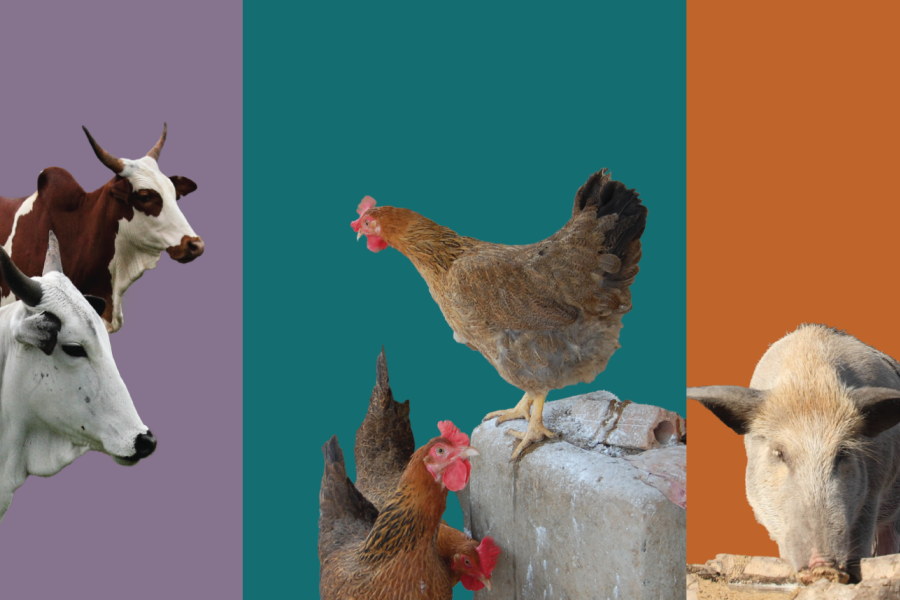LD4D Annual Meeting 2024 recap: Driving collaborative innovation

This year’s meeting celebrated achievements and charted the journey ahead
On 5 December, the Livestock Data for Decisions (LD4D) community came together for our 2024 Annual Virtual Meeting, to reflect on our remarkable progress and chart an ambitious and collaborative path forward for data-driven sustainable livestock development. Over 150 members joined us from around the world for a dynamic 90-minute event!
Watch the event recording
Celebrating collective progress
The meeting was more than just a routine gathering—it was a powerful demonstration of how shared expertise and cross-sector partnerships can drive meaningful change for livestock systems in low-and middle-income countries. Our network members reflected on their transformative work throughout 2023-2024, highlighting not just data collection, but the strategic application of insights to create real-world impact.
Meeting highlights
New Impact Statement
A significant moment was the unveiling of LD4D's new Impact Statement, which features an enhanced gender perspective. This signals the network's commitment to more inclusive and comprehensive livestock development strategies.
LD4D supports sustainable and inclusive livestock systems by leveraging data and evidence to inform policies, investments, and strategies.
Recognizing the vital role women play in livestock production, LD4D places a strong emphasis on gender equality, addressing the unique challenges faced by them.
Climate Finance Solutions Group
The Climate Finance Solutions Group celebrated its achievements, showcasing the power of collaboration for evidence-based decision making. For those eager to dive deeper, the network is calling on members and stakeholders to use and share the new evidence briefs, offering critical insights into climate finance in livestock development.
Explore the Climate Finance Evidence Briefs
Digital Innovations
We revisited our successful event on digital innovations in livestock development, which took place in July and August. The session highlighted LD4D’s future directions for this work including a stocktaking of digital innovations in the livestock sector, and future discussions on specific technologies, starting with satellite technologies for closing data gaps. LD4D members are also invited to participate in an upcoming February eConversation co-hosted Digital Agri Hub, to dive deep into the digital opportunities for livestock development.
Explore digital innovations and join the conversation
Gender Panel: Transforming Livestock Data
Our guest panel on transforming livestock data through a gender lens highlighted important advances. Led by Julie Koehler (SEBI-Livestock) and featuring experts Dr. Catherine Macharia-Mutie (Tanager) and Sofanit Mesfin (Ripple Effect), the session explored how gender-sensitive data can drive more equitable and effective livestock development.
The panel also issued a call to action for professionals interested in gender data innovations. Participants are encouraged to join our Gender & Livestock Data Community of Practice and engage in upcoming discussions with gender data innovators from Tanager and Ripple Effect.
Introducing the Feed Baskets Group
The meeting introduced the new Feed Baskets Group, through a "show and tell" session that highlighted innovative approaches to quantifying sustainable livestock feed systems. Five experts from international organizations shared their work. Giuseppe Tempio from FAO emphasized scaling mechanisms like GLEAM for calculating greenhouse gas emissions, while An Notenbaert from the Alliance of Bioversity and CIAT shared specialized tools for environmental impact quantification. John Mutua of the University of Edinburgh addressed current data limitations by proposing innovative earth observation techniques for diet composition analysis. Dr. Séga Ndao from the New Zealand Agricultural Greenhouse Gas Research Centre stressed the need for global research networks to preserve feed basket data, and Adegbola Tolulope Adesogan from the University of Florida underscored how comprehensive feed characterization can facilitate farmer access to high-quality feed resources, particularly in African countries.
In 2025, the group will be seeking further from the LD4D network, and members are invited to provide their thoughts and help shape the development of this exciting new working group.
Deepening member engagement: we’re listening
Over the last year, the LD4D secretariat has carefully examined input from previous annual meetings and one-on-one interviews to understand members' aspirations and needs. You expressed a clear desire to better understand what membership means, how to engage, and the opportunities available. Our network's new engagement strategy directly addresses these insights, offering multiple pathways for professionals to drive impact.
With over 1,600 members from nearly 80 countries, LD4D now provides targeted opportunities including Solutions Groups, Communities of Practice, and networking events. Membership remains free and open to researchers, policymakers, investors, and implementers passionate about sustainable livestock development. We invite members to connect, learn, and collaborate under our new tagline: "Connect, learn, collaborate: powering together data-driven decisions towards sustainable livestock."
We listened to your feedback and updated LD4D’s website with:
- A clearer subscription page
- A new Become a member page
- a “Ways to engage” page to be published soon
We invite you to join us over on our new LD4D LinkedIn page, which has nearly 800 members and is growing fast. And we will explore how we can use additional communications channels such as WhatsApp to better connect with you in the coming year.
Looking ahead
As the virtual meeting concluded, members expressed a clear feeling of optimism and purpose. The LD4D has community demonstrated that by working together, sharing knowledge, and maintaining a focus on evidence-based, inclusive development, transformative change in the livestock sector is possible.
Stay connected through our LinkedIn page, newsletter, or by emailing us.
The 2024 Annual Meeting wasn't just a recap of achievements; it was a blueprint for future innovation. We can't wait to see what collaborative solutions emerge next!



